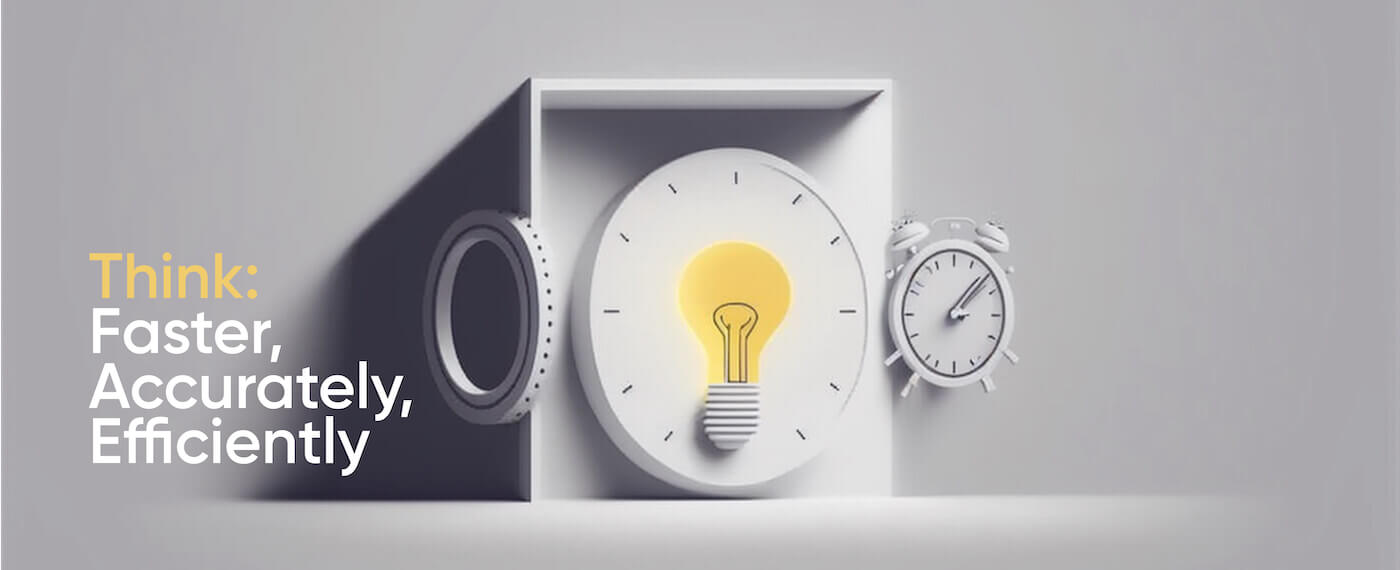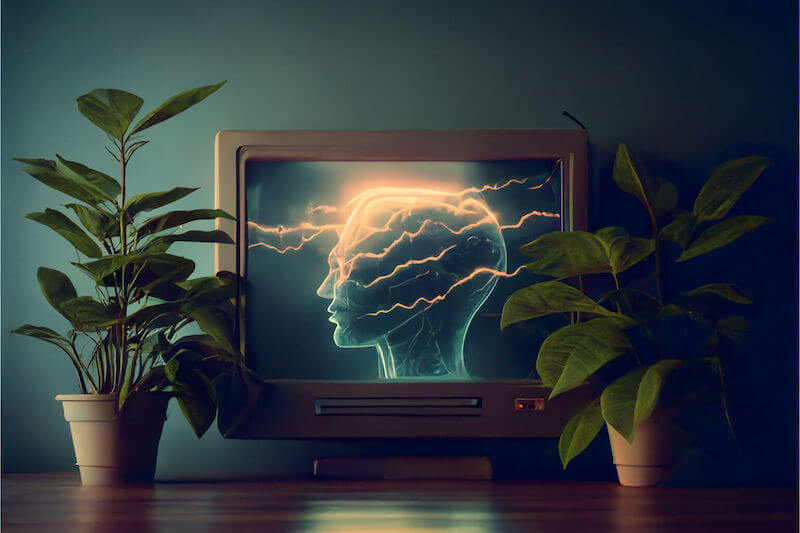
How to Think Faster, Accurately, and Efficiently
Table of Contents
Fast thinking refers to our neural network’s ability to respond to cognitive processing and make quick and well-informed decisions. Thinkers who output mental results quickly usually do it automatically without extra effort. Even with a slow brain, it is possible to transform it by applying powerful cognitive tools and exercises or restructuring one’s lifestyle.
The purpose of mental exercises is to grow the ability to combine accuracy and excellent cognitive speed. Fighting harmful factors that compromise the speed of thought appears to assist in retaining brain connections and cells. New experiences also have positive effects. Wondering if it’s worth spending your precious time on getting your mind laser-focused, remember several key facts. Quick thinkers report being more self-reliant, showing confidence in one’s mental power, choices, and actions. Fast-brained individuals are more charismatic and can easily inspire devotion in others. Being strong in character means greater efficiency in every matter. Exploring tips on how to think faster will help you enhance skills such as planning, problem-solving, and collaborating with others. You will stay mentally agile as you age and, generally, be satisfied with your life.
Why It Is Needed to Think Faster?
Adjusting cognitive activity as per the fast pace of the contemporary world will be a tall order for slow thinkers. Hitting intellectual leaps will take time. The thought of what things come next will be disturbing. Usually, spending more time reasoning about the problem means more solid results. However, it doesn’t mean that every issue must be addressed in such a thinking mode. Sometimes, obsessing over a problem will take time, leaving one with no result. Moreover, if fast thinkers will easily cope with sudden changes, slow minds are not so flexible. To fight against low-speed data processing and discover how to work faster, it is paramount to understand what are the triggers that cause such a mental state.
Mental or physical injuries
Brain injuries may have wide-ranging effects on cognitive functioning. Temporarily impaired brain functions stem from various physical injuries too. Problems range from memory lapses to dizziness. Lots of patients with traumatic, as well as non-traumatic brain damage report extreme mental fatigue or even intense irritability. Competent healthcare assistance is required to restore cognition, memory, and strong reasoning. Otherwise, the symptoms will be aggravated.
Digital amnesia
Technology has really transformed our world, both in good and bad ways. While using digitalized memory apps is good for our visualization, abstract thinking, and cognitive response, overusing the Internet provokes thinking laziness. Just think, when the last time you memorized someone’s phone number was? Most individuals will say that this is a waste of time — why would someone remember the number when it can be stored in the phone’s memory? We heavily rely on our phones, digital tools, and the Internet for even basic living skills, such as finding a way to some place or destination. Most people set reminders instead of encoding their plans and important dates. As a result, the brain is less likely to remember things.
Lack of rest
Lack of rest may lead to a delayed reaction to events or poor analysis. Losing concentration, speed of thought, or keenness does not always mean serious cognitive issues. Sometimes, all that is needed is a good rest and mental renewal.

How to Improve the Speed Of Thought
It is okay to forget some words, fumble for things, or forget new information — our memory system can erase some not important episodes and encode only the data that deems vital. While a one-off forgetting moment is okay, continuous lapses are recognized as out of the norm. So mental activity is pivotal for keeping the brain in shape. Here are the top recommendations that are pegged as crucial activities for your mental capacity.
Minor decisions should be made faster
We live in a world with an immense amount of major and minor choices. Even daily picks that used to be straightforward are now made only after a long analysis with excessive thinking efforts. However, overthinking the small stuff can also put unwanted extra pressure on your cognition. Some individuals tend to drag out the decision-making process till their brain resources are exhausted. There is a strong need to learn how to miss these over-analysis moments and be confident with each of your decision. By learning this essential skill, you will also unlock secrets to how to work faster, memorize more, and be quite productive even under stress. The first recommendation for faster decisions is to avoid letting your emotions, fears, and hesitations control you. Do adequate research and know where to stop to investigate better options. This is how you shorten the path from finding a solution to its adoption. Finally, work on your general mental abilities, for example, with the help of a mnemonic device or specially designed apps.
Stop multitasking
One of the proven facts about the human brain is that it can have only one strong focus at a time. Solving multiple issues at once reduces performance, and it is backed up by science. When we are dealing with a few tasks, our attention flicks back and forth between them. So trying to multitask may seem effective, but it is inefficient and counterproductive. It puts lots of pressure on the cognitive system, and such overload spawns slow thinking. Dave Crenshaw believes that most individuals who are convinced that they multitask are actually just engaged in back-tasking or switch-tasking. An example of task switching might be messaging a friend while reading this article. Back-task is when some events or actions happen in the background while you are engaged in the main activity. By knowing more about such types of phenomena, you can better understand your mental behavior, how to gain more control over mental functions or how to improve short-term memory, where to start your cognitive growth, and so on.
Sleep repairs thinking power and emotional resistance
Your brain needs adequate rest to recharge itself. Having a good night’s rest and healthy sleep means your entire cognitive system can have time to reorganize freshly-shaped memories and newly gained information, so it can have optimal performance the next day. This is how you can retrieve complex sets of data and use facts placed in the memory storage, for example, during an exam. Apart from quick thinking, it supports your emotional intelligence. The thing is that while we are sleeping, our brains process not only information that we have been collecting all day but our emotions as well. That means we’ll experience fewer adverse emotional reactions and more positive ones throughout the next day. Sleep is important for our resilience and stress resistance too. Remember that healthy sleeping patterns are restorative and re-energizing.
Exercise for boosting your alertness
Without supporting brain plasticity, all attempts to become smarter and already gained progress can be nullified. However, physical activities can make a difference in how your brain produces mental outcomes and builds new cells. Enhancing positive functional and structural changes in the multiple regions of our brains, physical activities are a must-have routine for those individuals who seek proven ways and recommendations for how to think faster. Even a 15-minute daily workout facilitates data encoding, stimulates mind speed, and increases the creation of fresh neural pathways.

Boost your dopamine level
You’ve probably heard about dopamine before. Since it is responsible for our mood, behaviors, and inspiration to act, this chemical is also known as a pleasure compound. But this fact is a bit confusing because it doesn’t actually create pleasure or a sense of satisfaction. What it does do, is reinforce it. Just imagine that you are eating your favorite dish or listening to your favorite song. As we feel enjoyment from this, dopamine is released. This is how we gain motivation to seek out those rewarding situations and experiences further. But this component is much more important than it seems at first glance. It affects our memorization capacity, emotional and cognitive regulation, and sensory processing. More dopamine means stronger brain power.
Be socially active
Socialization pertains to one of the most powerful mental exercises. It has a great effect on nearly all kinds of reasoning, creative and concrete thinking, logic, and analytical skills. Regular social interaction is about new experiences that stimulate the intellect, stave off aging symptoms, and make all your thinking modes more agile and efficient.
Supplements that contribute to quick thinking
One of the natural remedies that defend the brain from Alzheimer’s disease is black cumin. Adding it to your diet means better brain protective capacity. The same situation is with branched-chain amino acids. It not only improves learning, but also supports the treatment of mental disorders. As for caffeine, probably it does not reinforce mental power. But it has a short-term energizing effect, boosting the time of response and alertness. Some of the memory troubles emanate from a deficiency of vitamin D, so restoration of its levels can make a difference too. Finally, people who consume fish oil will have a larger brain volume in old age than those with low levels of omega-3 fatty acids.
FAQ
How can I work faster and smarter?
Cultivating awareness of how humans process information supports understanding of what to do to make your brain health stronger, get more acute mind abilities, and keep one’s focus. Incorporating physical activity or adding vitamin D to your diet, there must be an understanding of how it will affect the connections in your brain.
How do we think?
The thinking mechanism is complex and consists of various processes within the cognitive system. Thousands of neurons are at the heart of these complicated chemical processes responsible for the formation and speed of thought.
What type of disorder that can disrupt thinking?
There are lots of triggers for impaired cognitive function: mood or psychotic disorders, as well as dementia, are some of them.